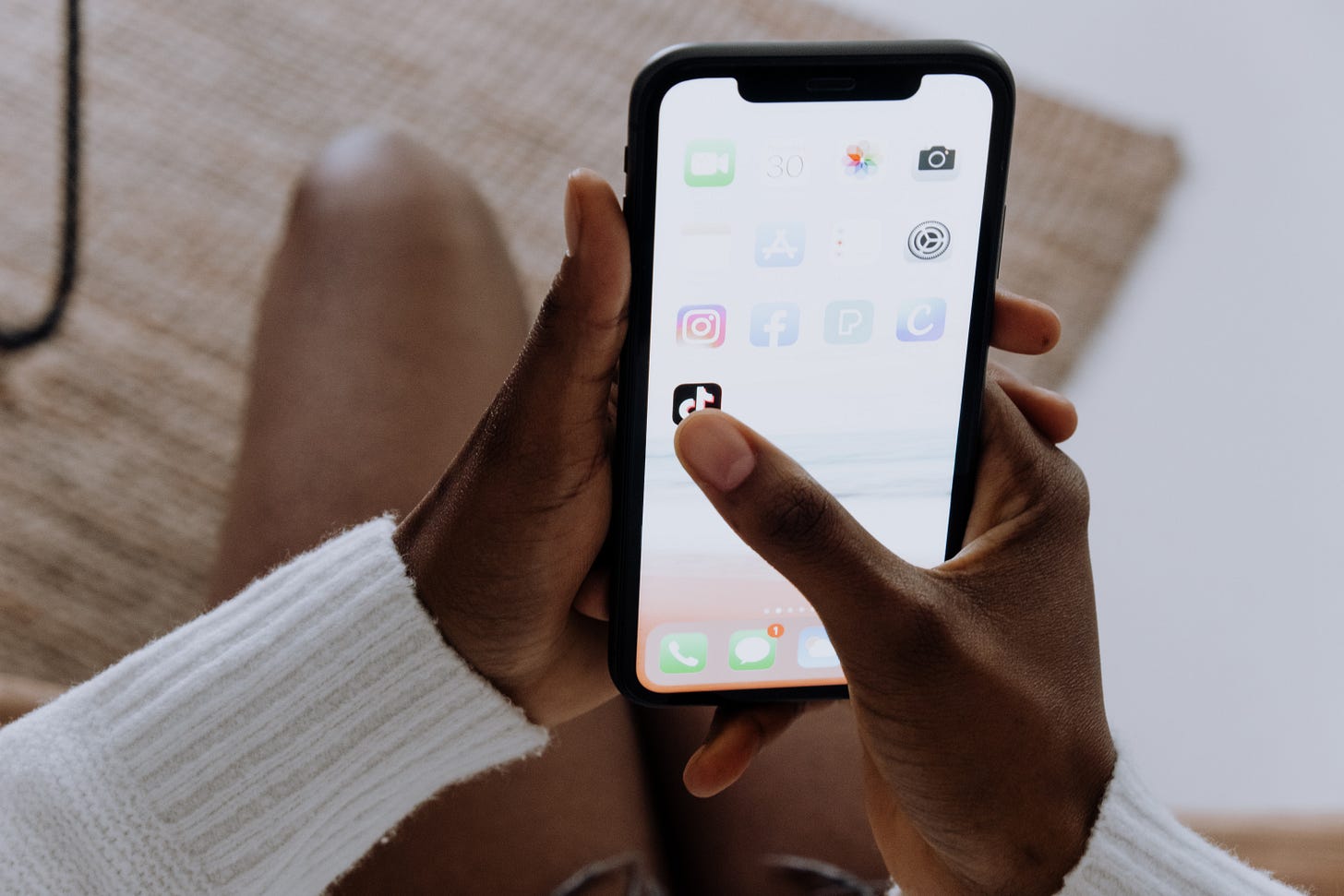TikTok offers a lukewarm caution against the milk crate challenge
Plus: The suicide squad backs down (for now) and the face mask I’m counting on to make me look less tired than I’ll feel after a long flight later this week.
●
The news cycle is teeming with a lot of tech updates that have political and creator implications that I’ll share in a moment. But first, a quick bit of breaking news: Former NFL player Herschel Walker is running for the US Senate against Georgia Sen. Raphael Warnock, one of the two senators who delivered Democrats the majority in a January runoff election.
His candidacy is proof that Republicans would still rather rely on outsiders to fight culture wars than put forward serious aspirants with policy ideas that are worth debating. Greg Bluestein at The Atlanta Journal-Constitution was the first to report the news. A spokesperson for Sen. Warnock did not respond to a request from The Supercreator for comment.
Walker was encouraged to run by Donald T**** but has a checkered past that will likely be the source of Democratic attacks during the midterm campaign next year. He’s also father to Christian Walker, a Gen Z anti-Black conservative known for his OTT TikTok videos. (If you’re unfamiliar, New York magazine published a puff piece on the 21-year-old in March.)
In TikTok news, the company announced a partnership with the e-commerce app Shopify that enables selected merchants to add a shopping tab to their profiles and link to products within TikTok. (Shopify said it expected the feature to be available to all merchants this fall, according to Erin Woo at The New York Times.) The partnership follows in Facebook and Instagram’s footsteps as apps jostle for supremacy in a space known as “social commerce.”
TikTok also just launched a new creative toolset called TikTok Effect Studio, which will allow its own community to build augmented reality effects for the app. The company told Sarah Perez at TechCrunch that Effect Studio is an experiment and is currently in private beta testing. But if the platform launches, it’s expected to compete with Facebook and Snap, which have made deep investments in AR experiences.
And finally, I’m sure you’ve seen or heard about the milk crate challenge. If not, here’s a quick description from Fast Company’s Connie Lin of the madness:
This involves stacking empty crates into a rickety, makeshift staircase and attempting to traverse it without greeting the floor with your face. The task seems simple enough, but many tries somehow end with the structure toppling over like Jenga with the challenger in mid-crossing.
Well, TikTok wants you to know it doesn’t endorse the dangerous trend even though the trend has collected 15 million views, is easily discoverable via a quick search and people have literally broken bones for what I’m not quite sure: “TikTok prohibits content that promotes or glorifies dangerous acts, and we remove videos and redirect searches to our Community Guidelines to discourage such content,” the company said in a statement to Lin. “We encourage everyone to exercise caution in their behavior whether online or off.” Alrighty then.
A few other tech tidbits:
Instagram is retiring the swipe-up feature that allows people to visit external webpages by, well, swiping up on their device. Instead, the app is introducing “link stickers” that enable people to tap in stories to go to external sites.
Spotify announced that US-based podcasters can use its podcasting app Anchor to sell subscriptions for exclusive episodes. The best part: Podcasters will be able to download the email addresses of paid subscribers who opt in to establish an independent connection with them and take their list with them if they choose to leave Anchor.
Google is personalizing the ratings and reviews Android users see in the Play Store by country and device (tablet, Chromebook, wearables, etc.) to make the information more valuable. The first updates are expected in November.
The CEOs of Apple, Microsoft and Amazon are meeting with President Joe Biden tomorrow to discuss how private companies can improve cybersecurity after an increase in ransomware and online attacks over the past year. Bloomberg’s Rebecca Kern had the story first.
● ●
Last weekend, Texas’s Republican Lt. Gov. Dan Patrick said Black people were the “biggest group” of unvaccinated Americans:
It’s up to the Democrats, just as it’s up to the Republicans, to try to get as many people vaccinated, but we respect the fact that if people don’t want the vaccination, we’re not gonna force it on them. That’s their individual right. But in terms of criticizing the Republicans for this, we’re encouraging people to take it, but they’re doing nothing for the African American community that has a significant high number of unvaccinated people, so they need to address that.”
So, here’s the deal. It’s true Black Texans are vaccinated at lower rates than whites and Latinos, but a new poll from NBC News confirms that at 76 percent, Black American adults represent the most vaccinated demographic in the country. (71 percent of Latino adults say they’ve been vaccinated along with 66 percent of white adults.)
Staying in the south, Alabama currently has the lowest vaccination rate in the country. So CNN sent a reporter to the state to talk to unvaccinated residents. And, well, see for yourself:
I’ve never been more proud to be a “sheep.” 🙄
● ● ●
Yesterday, I reported that House Democrats were scheduled to vote on advancing the budget resolution for President Biden’s jobs and families plans and a voting rights bill that would restore several provisions protections that were removed via a 2013 Supreme Court decision. But it didn’t happen because the suicide squad, a group of now-10 conservative Democrats, withheld their votes because they disagree with Speaker Nancy Pelosi’s strategy of holding a bipartisan infrastructure deal until the budget is completed.
Pelosi brokered a deal with the squad’s leader Rep. Josh Gottheimer of New Jersey to hold a vote for the bipartisan infrastructure deal by Sep. 27 in exchange for their support tonight on the resolution and voting rights legislation. Progressive Democrats like New York’s Alexandria Ocasio-Cortez are uncommitted to voting for the bill by that date unless the budget passes both the House and Senate first, which makes the deal with the suicide squad moot.
But for now, the crisis is averted. And as Jonathan Chait at Intelligencer wrote, this was a huge waste of time that did more damage to the Democratic Party than it did to meaningfully advance the suicide squad’s personal interests:
Gottheimer’s plan was always unlikely: He wanted to extort the vast majority of his party into surrendering its negotiating leverage to him, but his plan required them to cooperate by voting for the bill he wanted to pass, on his schedule. What he succeeded in doing was gumming up the works in Congress, increasing the perception that Biden’s party couldn’t govern, and cementing a media narrative that benefited him personally at the expense of Democrats most in danger of losing their seats.
Rep. Hakeem Jeffries, who also serves as chair of the Democratic Caucus, was asked about this during the House Democrats’ weekly press conference and downplayed the impasse as a function of democracy. “Democrats are not a cult, we’re a coalition,” he said, in a thinly veiled shot at the opposition party, before adding he was proud to be a part of a “passionate caucus that gets things done.”
In the end, there was little doubt that Pelosi would figure something out. (Get into that rhyme — your boy has BARS!) “Never bet against Nancy Pelosi,” Rep. John Larson of Connecticut said. “Knowing the enormous amount of work that goes into something like this, and in the very narrow margins that we have, it makes her job even more extraordinary. And she also takes all the heat for being the leader.”
The Biden administration asked the Supreme Court yesterday to maintain the targeted eviction moratorium the Centers for Disease Control and Prevention announced earlier this month after Rep. Cori Bush sat outside the Capitol building in protest for the extension.
Here’s Robert Barnes at The Washington Post:
There is reason to think the high court might agree. In June, the justices on a narrow vote left a previous version of the eviction ban in place, when it was supposed to expire at the end of July. Justice Brett Kavanaugh, who cast the deciding vote, said he thought the ban should be allowed to wind down. But he added that he believed CDC lacked authority, and that congressional action would be needed to impose a new moratorium.
During the House Democrats’ presser today, Rep. Pete Aguilar of California said almost half — $21 billion — of the more than $46 billion in emergency rental assistance had been administered since the extended moratorium was issued.
It’s the first time New York surpassed San Francisco since the company that reported the data started tracking it in 2014.
Read All About It
Conor Friedersdorf at The Atlantic on the death toll of delay:
Waiting for an additional four months of data, the group pointed out, will give the virus more time to spread. The academy’s claim is not that the Pfizer and Moderna vaccines carry no short- or long-term risks. The organization acknowledges that extremely rare cases of a heart inflammation called myocarditis have been reported among adolescents and young adults. But it also notes that such cases are most likely to occur within four weeks and not after six weeks. The pediatricians argue that six months of data are highly unlikely to tell us anything about those risks that we don’t know after two months. If your concern is that an mRNA vaccine could have an unforeseen downside that doesn’t manifest for 10 years, delaying the vaccine another four months isn’t going to catch that. Meanwhile, society would incur the cost of delay without the benefit of assurance that there is no long-term risk.
Charlotte Shane at The Cut on why it’s time to stop asking sex workers to fix sex work:
In an increasingly cashless economy, the banking industry exerts a terrifying degree of control over us all, but sex workers have long been especially vulnerable to denial of accounts, loans, and mortgages, regardless of whether or not their work is technically legal. Paypal, Venmo, Stripe, Square, CashApp, and ApplePay all have terms of service that forbid payment for any sort of sexual product or service — again, including those that are legal — and those processors can also refuse sex workers just by virtue of their engagement in the sex industry, even if their use of the platform is unrelated. While many sex workers have tried to pivot to cryptocurrency, it’s far from a permanent solution, and even as a stopgap requires fresh-tech literacy and the time to acquire it, which are luxuries many workers can’t afford.
Lavanya Ramanathan at Vox on how Martha’s Vineyard became a Black summertime sanctuary:
Since the 1800s, Martha’s Vineyard (and the Inkwell) has been a renowned getaway for these Black families. The elite mingle with middle-class families on the island: Former President Barack Obama is rumored to have celebrated his birthday this month in his seven-bedroom mansion on Martha’s Vineyard. The island’s regulars over the years have included Henry Louis Gates Jr. and the late Vernon Jordan; Maya Angelou once described the town of Oak Bluffs, which includes Inkwell Beach, as “a safe place where we can go as we are and not be questioned.”
Michael’s Pick
Jaxon Lane Bro Mask ($28): I’m counting on this mask — featuring skincare bona fides like niacinamide, collagen, hyaluronic acid — to make me look less tired than I’ll feel after a long flight later this week.





